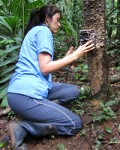Northrop Grumman Foundation and Conservation International collaborate to provide a unique field experience for science teachers nationwide.
Program Description
Global climate change currently challenges the status quo on planet Earth. As we face the impacts associated with global climate change, including potential extinctions, crop failures, habitat loss, and temperature extremes, environmental literacy must be a top priority for all of our students.
Environmental literacy is based on a strong scientific foundation: as students learn about the natural world and our dependence on healthy ecosystems, they develop the awareness and skills necessary to tackle ongoing challenges from human-induced problems. However, it is widely acknowledged among educators and policymakers that insufficient numbers of students are entering into science, technology  engineering and math (STEM) fields to meet the growing demands of scientifically-sound understanding and responses to these challenges.
engineering and math (STEM) fields to meet the growing demands of scientifically-sound understanding and responses to these challenges.
We need young minds focused on innovative solutions to our climate challenges. One way to address this issue and emphasize environmental stewardship is to engage students in the sciences and math by developing real-world curricula and hands-on experiences for students. In order to motivate students, we must have educators who are excited and well-informed about the subjects they teach and have the skills and abilities to bring unique learning opportunities into their classrooms.
With the goal of providing teachers with resources and learning opportunities in environmental science, the Northrop Grumman Foundation has collaborated with Conservation International (CI) to launch the ECO Classroom program. This unique, nationwide teacher professional development program is designed to equip teachers so they can inspire students to pursue science and technical careers and become our next generation of environmental stewards and innovators. “The Northrop Grumman Foundation has been pioneering programs to inspire science teachers for many years now,” said Sandra Evers-Manly, president of the Northrop Grumman Foundation. “We have turned our focus to the environmental sciences in recognition of the importance of international environmental sustainability to the health and security of future generations. We believe that providing a hands-on environmental experience to science teachers will give them insight and inspiration that they can pass on to their students as well as other teachers, stimulating an increase in the pursuit of STEM degrees and careers, especially in the environmental sciences.”
Teacher participants will travel to Conservation International’s Tropical Ecology Assessment and Monitoring (TEAM) Network sites, where teachers will experience first-hand field collection of biodiversity and climate data using TEAM scientific protocols.
During July 2012, CI staff will take 16 middle and high school life sciences teachers (biology, ecology, environmental or earth systems science) to the TEAM field site at La Selva Biological Station in Costa Rica for an intensive, two-week  field experience. Teachers will spend time in the field and classroom gaining first hand experience in the data collection protocols as practiced by the TEAM researchers, using camera traps, satellite imaging data, and other advanced field technologies. They will conduct teacher team-initiated research projects at La Selva that would be replicable at their schools or school communities throughout the U.S.
field experience. Teachers will spend time in the field and classroom gaining first hand experience in the data collection protocols as practiced by the TEAM researchers, using camera traps, satellite imaging data, and other advanced field technologies. They will conduct teacher team-initiated research projects at La Selva that would be replicable at their schools or school communities throughout the U.S.
These teachers will return to their schools with an in-depth understanding of the interrelationship between biodiversity, climate change, and human activities, and will be equipped with new techniques and resources to enhance their own classroom teaching. Additional teacher trips are planned for 2013 and 2014
